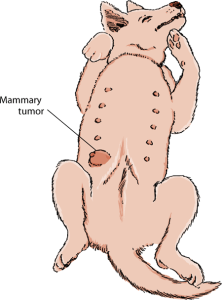Spays & Neuters Prevent More Than Puppies and Kittens
When your pet is spayed or neutered the benefits of the procedure go beyond the burden of an unwanted litter. From helping to curb unwanted behavioral issues to reducing or eliminating the risk of certain cancers and infection. Spaying / neutering your pet can help improve their quality of life in more ways than one.
Reducing the risk of cancer:
When you spay your pet before she goes into her first heat you drastically reduce and possibly eliminate the risk of certain cancers; mammary gland tumors, ovarian, and uterine cancer.
The same is true for pets neutered early on. The chance of testicular cancer is eliminated for neutered dogs. The procedure will also help decrease the risk of complications due to an enlarged prostate. These health benefits alone can add years to your pet’s life.
Reducing the risk of infection:
In addition to decreasing the risk of cancer you will eliminate the risk of a severe uterine infection, Pyometra. This infection, if not treated quickly can be lethal. Another uterine infection of unspayed females is Metritis. This bacterial infection is caused by difficulties related to birthing complications. If the infection does not get treated it could lead to abdominal infection and/or a ruptured uterus. Typically, this type of infection requires hospitalization.
In the same vein, un-neutered dogs are at a greater risk for infections such as prostatitis. Prostatitis can be acute or chronic. While all male dogs (specifically older male dogs) are susceptible to developing prostatitis unneutered dogs are at a greater risk.
Positive behavioral changes:
Your pet’s personality isn’t affected by the spay / neuter procedure. If they are a happy go lucky dog or a playful lap cat this won’t change after their procedure. What will change is their behaviors associated with the surge of hormones they experience when in heat or around another animal in heat. This means your cat won’t feel compelled to sing kitty love songs at the top of her lungs! If your cat sprays, the earlier your cat is altered the greater the chances of curbing this behavior altogether. However, if the spraying continues the urine won’t be as pungent.
Additionally, your pet’s drive to get out of the house to attract or find a mate won’t be a top priority. This should put a stop to crying to go out, door dashing, roaming, digging under fences etc. Unwanted mounting will also decrease as will anxiety, clingy behavior, and irritability. With all of these changes it’s important to note that behavioral changes related to sex hormones are more likely to occur the sooner your dog or cat is spayed / neutered.
Additional fun facts about reproduction:
Cats and dogs will mate with litter mates once they are of age. They will also mate with other relatives. The only way to ensure your same species pets won’t reproduce with each other is have same sex dogs or cats or spay and neuter your pets.
It is possible for your much larger dog to be impregnated by your much smaller dog (Husky-Pomeranian puppies anyone?)
Your male dog or cat will not feel less masculine after he is neutered. Masculinity is a human construct.
Your male dog will still lift his leg when he urinates. This is an instinctual behavior that is unaffected by the neutering procedure.
Cats reach sexual maturity around 5-6 months of age at which time they are capable of having a litter. Female dogs have their first heat around 6 months. However, breed / size can affect their sexual maturity timeline. Small breed dogs can have their first heat as young as 4 months!
Neutering your dog or cat will not make him suddenly lethargic and obese.
Your dog or cat does not need to have a litter prior to being spayed. There is no medical evidence supporting this idea.
Female dogs and cats do not go through menopause. The length of time between heats may increase with time and fertility will decrease as will the number of kittens or puppies produced per litter. However, they maintain the ability to reproduce throughout their lifetime if left unaltered.


